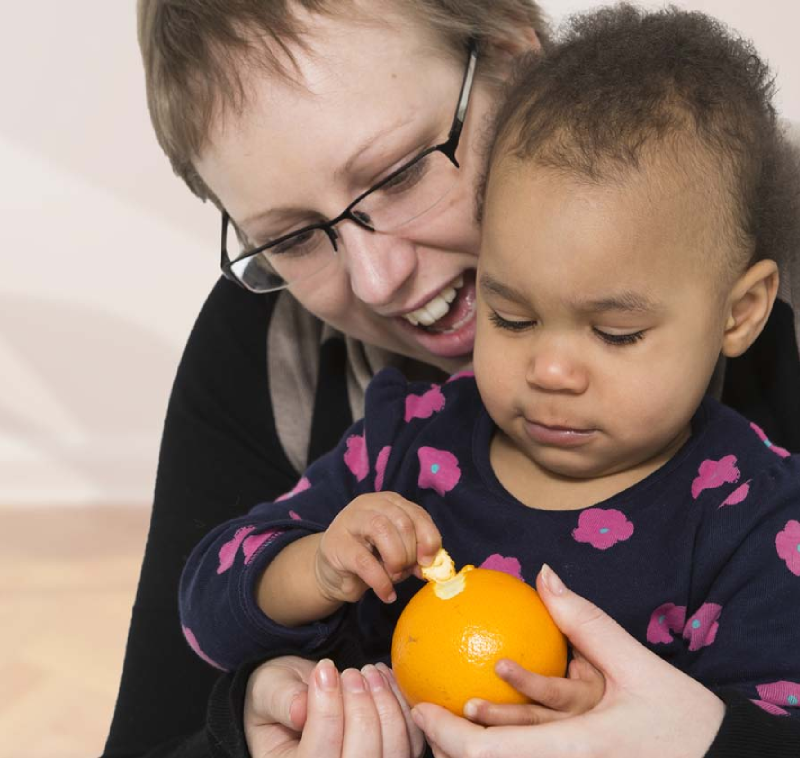Green
official nursery opening
Local Peep families, with guests Nigel Clarke and Baby Bear from CBeebies' The Baby Club, in the Nursery garden
Our Little Peeple Nursery in Littlemore, Oxford was officially opened by our local MP Anneliese Dodds, on Saturday 11 May. In her words: "I am delighted to have been invited to the official opening of Little Peeple Nursery. I'm pleased to see that Peeple works collaboratively with other agencies, including childminders and the local children and family centres, to provide much-needed support for young families in Littlemore and the Leys."
Thanks to all the local families and friends of Peeple who came (and brought the sun!), including Nigel from CBeebies' The Baby Club, and special guest Baby Bear.
Cutting the ribbon - left to right: Peeple CEO Sally Smith, Chair of Trustees Mark Harris, MP Anneliese Dodds and Childcare Manager Lindsey Hart
Little Peeple is a 44-place day nursery and pre-school providing early education and care for babies and young children from 6 months to four years. It's a new, purpose-built setting on the site of The Oxford Academy, built as a joint project between the school, the County Council and Peeple. It is run by Peeple, a charity which has been providing support for families with young children in The Leys, Rose Hill and Littlemore since 1995.
Lindsey Hart manages the nursery: “We are here to support parents, carers and children to learn together by valuing and building on the wonderful job that parents already do. Whether you are returning to work, preparing your child for school or want your child to socialise with other children, we are here to work with you to meet the needs of you and your child.”
Dr Sally Smith, Peeple CEO: “We want Little Peeple to offer children a home from home. We are open to all families from the community and to staff at the Oxford Academy. We are particularly pleased to provide opportunities for the students to gain work experience with us – they are the parents of the future!”
Please get in touch if you'd like to visit another time or arrange a place for your child to attend: t 01865 397972 or e littlepeeplenursery@peeple.org.uk. Little Peeple Nursery, Northfield Close, Littlemore, Oxford OX4 4NH.
Feature box colour:
contact us
Contact us with any questions, to arrange a visit or to book a place at Little Peeple Nursery
Email:
littlepeeplenursery@peeple.org.uk
Address (for sat nav):
Little Peeple Nursery
The Oxford Academy
Northfield Close entrance
Littlemore, Oxford
OX4 4NH
Tel: 01865 397972
Side Quote Color:
Peep Antenatal Programme and Policy Links - Scotland
The Peep Antenatal Programme (‘Getting to know your baby’) aims to support parents to:
- think about their baby, tune in to their baby's feelings and respond sensitively (also known as reflective function),
- understand the importance of sensitive parenting to developing a loving, consistent and secure attachment,
- become more aware of the social and emotional aspects of the transition to parenthood,
- manage their own (sometimes difficult) feelings that are aroused by a new baby,
- meet other expectant or new parents and develop a supportive network group,
- reduce the risk to the early parent–infant relationship (by helping to prevent, for example, isolation, anxiety and low-level depression),
- engage with other local services.
This helps parent-baby bonding and attachment. Research indicates that these strong relationships enhance parents' confidence and self-esteem, as well as contributing to better outcomes for the child.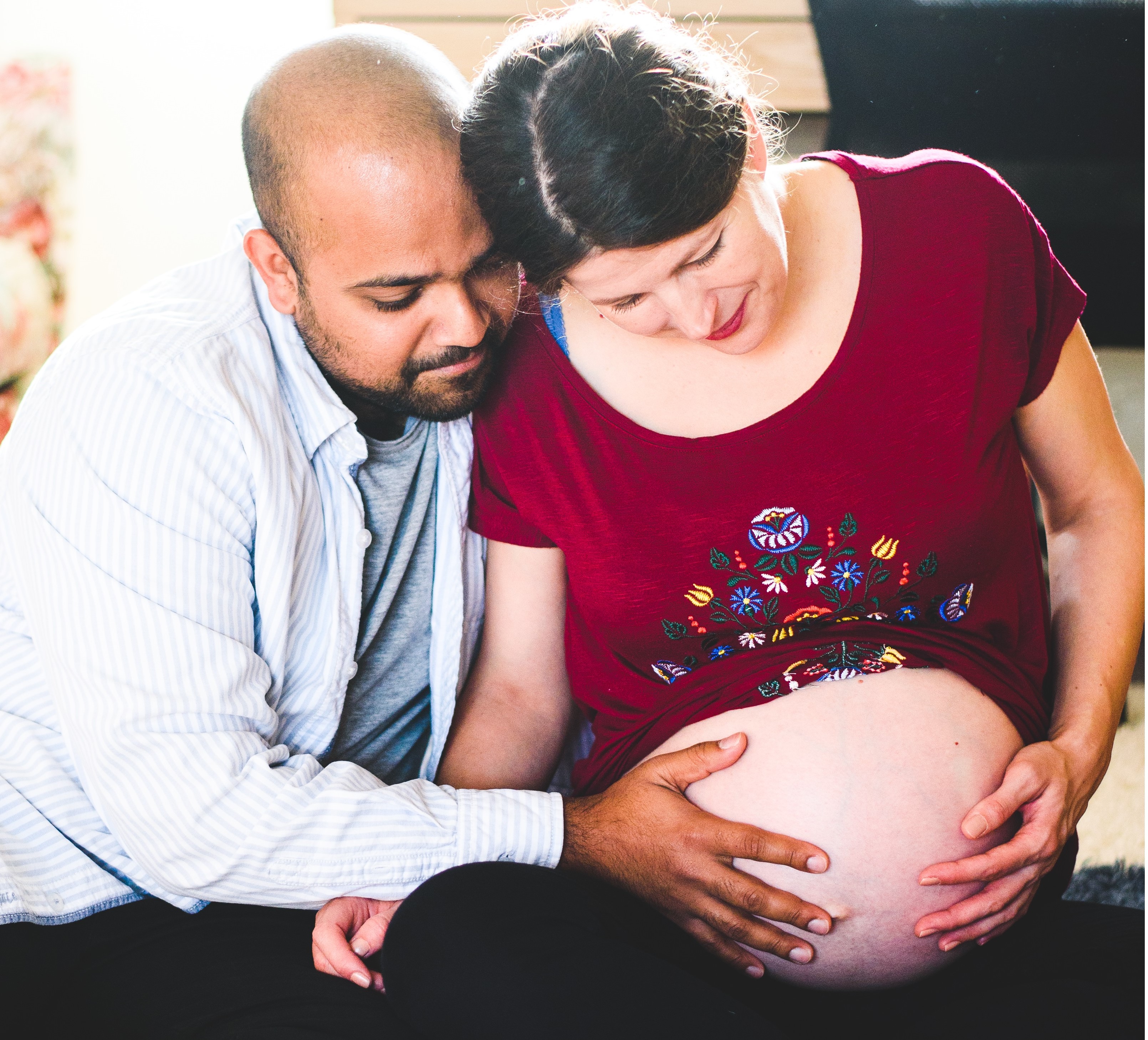
‘I didn’t realise my baby would be able to hear when he was born…’ (Dad)
The following policies cover attachment, the impact of parenthood, social connectedness, community cohesion, mental health and wellbeing, and child protection.
The United Nations Convention on the Rights of the Child (UNCRC) was ratified in the UK in 1991 and the Scottish Government are taking steps to ensure that children’s rights are respected as stipulated in the UNCRC. The First Minister committed in April this year, to incorporate the UN Convention on the Rights of the Child (UNCRC) into Scots law. This incorporation has the potential to bring a real culture shift and positive impact on families throughout Scotland.
The Peep Antenatal Programme reconciles several articles within the UNCRC including the right to play (article 31) and the right to learn (article 13).
Getting it right for every child (GIRFEC) is the national approach to supporting families in Scotland and is based on the values and principles which support the rights of children and of parents. The GIRFEC approach underpins all Scottish Government policies which support children and their families from the antenatal period, throughout childhood and the teenage years. GIRFEC promotes early intervention and working in partnership with families to identify what supports may be required.
The Peep Antenatal Programme (also known as ‘Getting to know your baby’) is a preventative/ early intervention approach which empowers parents by sharing research and best practice with parents in a very gentle and accessible way. The unborn child and newborn are at the heart of the programme, which recognises and values the incredible impact that sensitive parenting offers to child development, wellbeing and long term outcomes. The Peep Antenatal Programme can be delivered universally by a range of practitioners, and to higher-need parents with specialist guidance.
The Children and Young People (Scot) Act 2014 has children and young people at its heart in rights respecting service planning and delivery, with an ambitious aim to make Scotland the best place to grow up.
The Peep Antenatal Programme provides knowledge and skills for practitioners to work closely with families, sharing an understanding of their home environment and their social network in preparation for a newborn joining their world. Meaningful and effective messages are shared in an informal, welcoming group, accessible to all and specifically recognising the challenges which marginalised groups may face.
Better Health, Better Care (2007) and the Early Years Framework (2009) highlight the fundamental importance of early years experiences and emphasise the role of antenatal care. The Better Health Better Care Action Plan identifies that children who live in families where parental capacity is high and who have strong family and social networks often go on to enjoy better outcomes in later life. Better Health, Better Care is committed to strengthening “antenatal care to better engage with parents with higher needs…”
The Peep Antenatal Programme supports parents perinatally to consider babies' feelings and behaviour in order to respond appropriately and sensitively – essentially to keep baby in mind in order to promote healthy bonding and attachment.
The Early Years Framework (2009) reflects the Scottish Government's ambition for Scotland to be “the best place in the world to grow up, by reducing inequalities and improving outcomes for all babies, children, mothers, fathers and families across Scotland to ensure that all children have the best start in life and are ready to succeed”.
The Peep Antenatal Programme considers the social and emotional transitions which parenthood brings, and supports mothers, fathers and partners to become involved and meet other expectant families. Difficult feelings may be elicited by pregnancy and birth, and the programme provides a network for support and connections to local services and agencies.
The National Parenting Strategy (2012) states:
“The nurturant qualities of the environments where children grow up, live and learn - parents, caregivers, family and community – will have the most significant impact on their development,” and identifies that positive generational impact may be realised if we “… help parents lay strong foundations for the loving, nurturing relationships that we know are integral to children’s emotional, physical, socioeconomic and educational wellbeing”.
The Peep Antenatal Programme encourages and provides space and opportunity for parents to think about their child’s development and how they can nurture a strong bond before birth. Positive parenting is a basic human right of every child (UNCRC) and through the Peep Antenatal Programme we explore and learn how to ensure an “atmosphere of happiness, love and understanding” from the very earliest moments.
The National Parenting Strategy recognises the impact which access to appropriate, timely and person-centred support may have on new parents and their children.
The Peep Antenatal Programme's focus on the parent/baby bond, connectedness and developing attachment, can reduce risk to the early parent-newborn relationship, lessens social isolation, enhances parental self-esteem and confidence, and creates a supportive network, all contributing to this early intervention, strengths-based approach.
Feature box colour:
Side Quote Color:
prison case studies
Here are a few examples of how Peep-trained practitioners have used the Peep Learning Together Programme to support their work with fathers in prison.
The projects' broad aims have been to help families maintain their relationships during and after custody, by:
- supporting families visiting the prison,
- developing new and expectant dads’ skills and understanding about the importance of their role as a father,
- supporting positive transitions back into family life for young children whose parent is due for release.
Feature box colour:
find out more or book training
tel 01865 397 970
training@peeple.org.uk
> dates & booking
> in-house training
> training courses
> information briefing
> sign up to our e-newsletter
Get in touch if you're interested in using Peep programmes in any of these (or other!) ways.
Side Quote Color:
our sponsor: best years
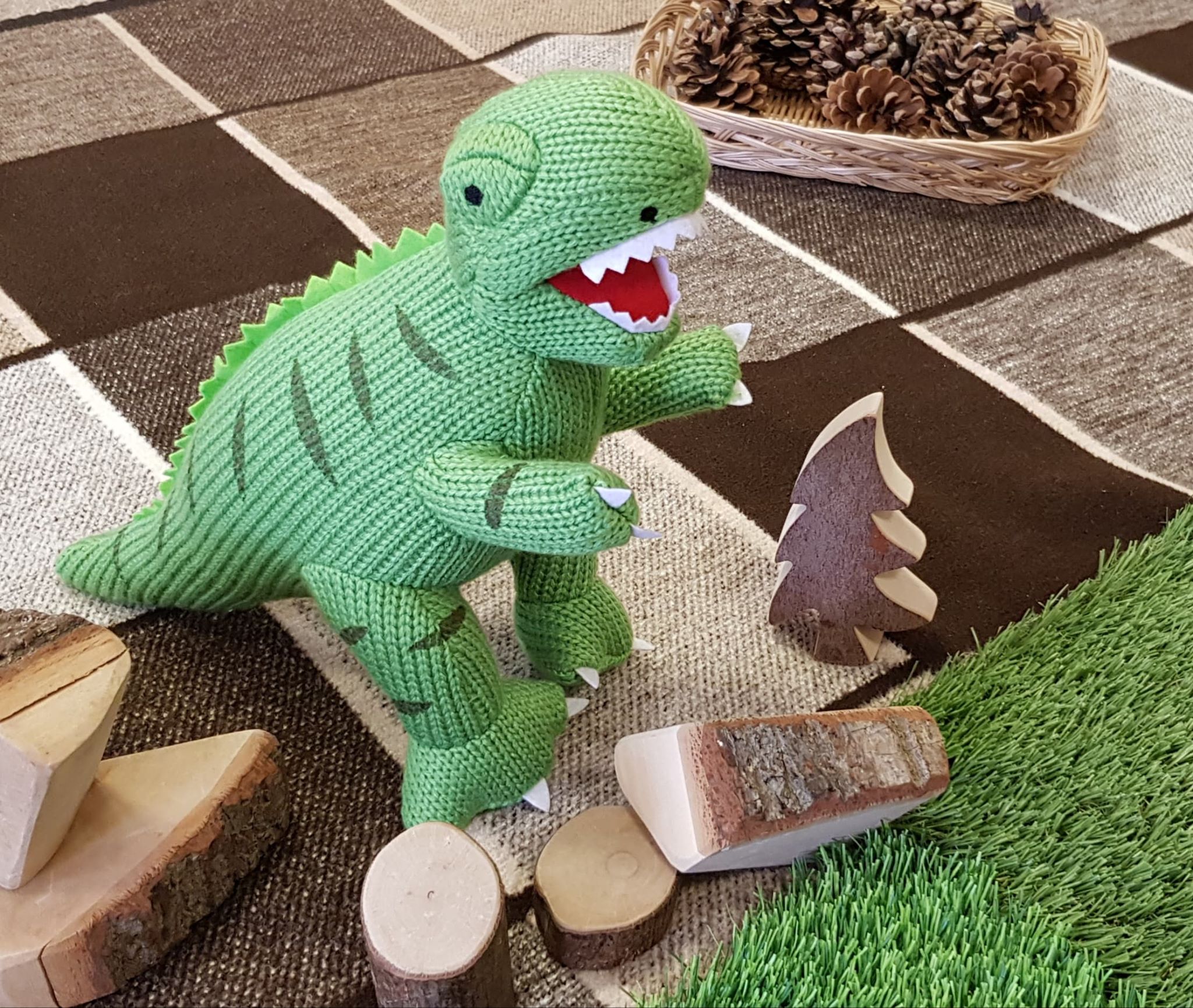 We’re delighted to be sponsored by Best Years, the ethical toy company, as their chosen charity for 2019. They have donated some of their beautiful knitted toys to us, for our local practitioners to use with families in Peep groups and in our Peep Pre-school and Little Peeple Nursery. We are also giving some away to Peep practitioners and families more widely, so keep an eye on our social media pages for opportunities to win them!
We’re delighted to be sponsored by Best Years, the ethical toy company, as their chosen charity for 2019. They have donated some of their beautiful knitted toys to us, for our local practitioners to use with families in Peep groups and in our Peep Pre-school and Little Peeple Nursery. We are also giving some away to Peep practitioners and families more widely, so keep an eye on our social media pages for opportunities to win them!
In the picture you can see the Best Years dinosaur that was won by Kaylee at Tattershall Children's Centre in Lincolnshire. The children in her Peep Learning Together Toddlers group have named him Harry, and he's been making lots of new friends.
Best Years not only specialise in tactile knitted toys that support the sensory development of babies and young children, but spend time developing relationships with the people who make their toys. You’ll see more of their toys on our pages in the coming months, and you can find out more about Best Years on their Facebook, Twitter or Instagram pages and on their blog.
Feature box colour:
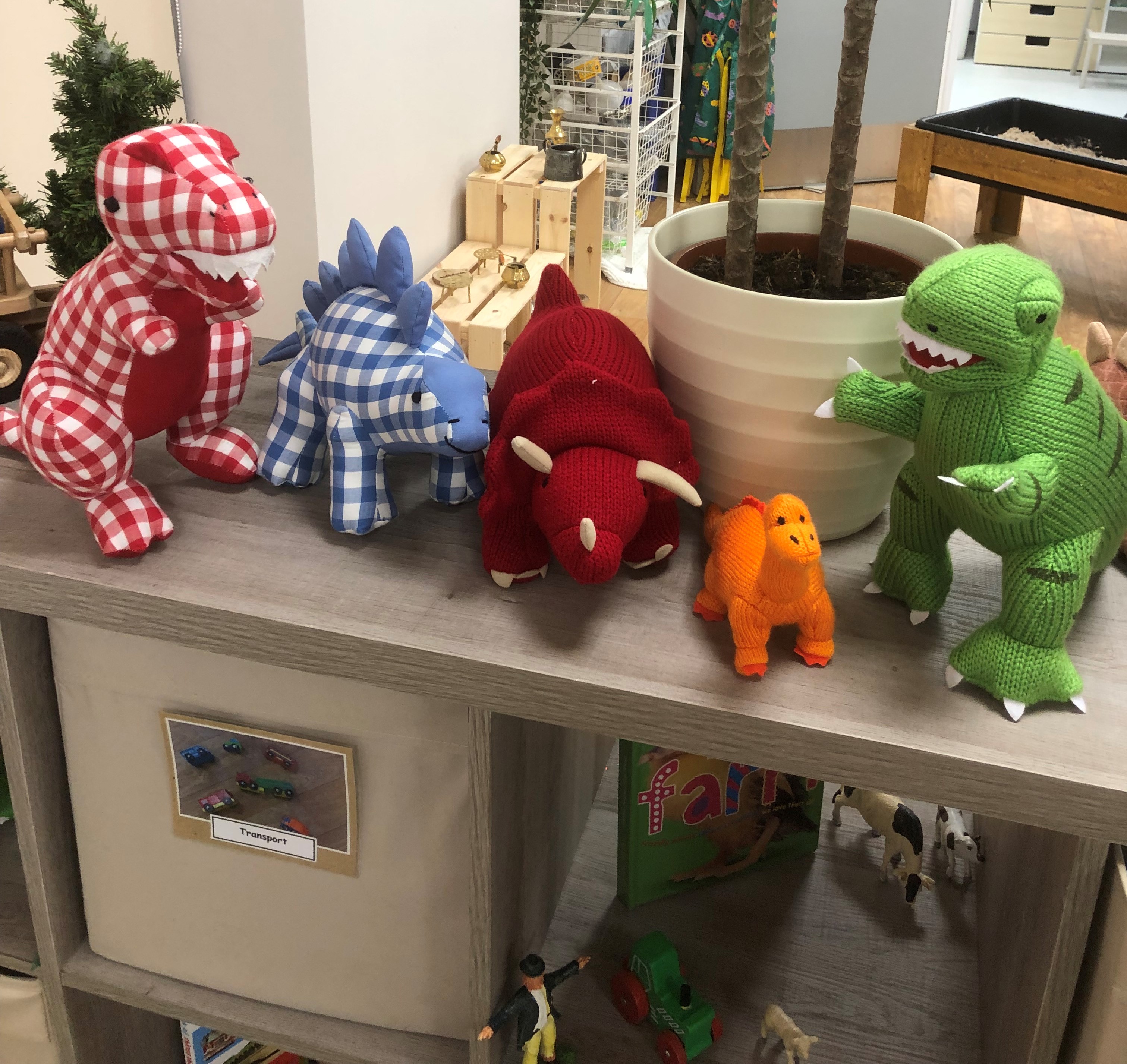
Side Quote Color:
educational psychology-led peep - Stirling
Peep was identified by the Educational Psychology Service in Stirling as a strong evidence-based programme which contributes to securing better outcomes for young children through increased parental engagement in their child’s learning. The Educational Psychology Service currently leads on the implementation of Peep in Stirling, working collaboratively with early years establishments and partners.
A number of practitioners have been trained to deliver Peep approaches across Stirling Council. They include family support workers in Health and Education, Early Years’ Educators from nurseries, as well as practitioners from Homestart and the Learning & Employability team.
Feature box colour:
Side Quote Color:
post-course delivery support
Peep practitioners cover a lot during our 2-day Learning Together Programme training, but it’s invaluable to have opportunities to share questions and practical tips with other Peep practitioners, when you’re doing Peep in ‘real life’, after the training.
Here are 5 types of Peep delivery support included in the training price – more info about them all in our log-in Members Area or contact us, and we look forward to seeing or hearing from you soon!
1 Website - with log-in areas for practitioners
As well as providing access to the whole programme (74 child development topics, session plans, parent handouts, etc), our log-in areas contain guidance on getting going with Peep delivery in a range of contexts. We also share case studies on our 'public' webpages, illustrating different ways that the Programme can be used.
2 Peep Champions: network meetings
Organisations and local authorities often have their own 'Peep champion(s)' – someone who has a real commitment to supporting colleagues with their Peep delivery, and works with managers to have a Peep overview and take things forward within the organisation/ LA. This can really help you make the most of the Peep Training and Programme in supporting local families. These regular meetings will provide an opportunity to share questions and ideas.
3 Newsletters for practitioners and managers
'Peep Postings' is for Peep-trained practitioners and their managers, focusing mainly on ideas and updates that support your Peep delivery. Our 'Peeple Newsletter' focuses more generally on working with families to support the home learning environment, and anyone can sign up. We automatically add Peep-trained practitioners and managers to both lists, but you can unsubscribe at any time.
4 Peep practitioner Facebook group and social media
We have a closed Facebook group for Peep LTP Practitioners, for sharing questions, experiences and tips about using Peep with families: www.facebook.com/groups/peepltppractitioners
We also post regular tips, ideas, links and updates (for parents as well as practitioners) via Twitter, Instagram and Facebook, all @PeepleCentre, which practitioners are welcome to re-post on your local social media pages. We love to hear about what families and practitioners are doing, and you're welcome to tag us.
5 Info briefing for managers
If you'd like a discussion with us any time about how you and your colleagues can make the most of Peep programmes within your organisation or local authority - maybe by finding our more about the different ways that your staff could use the programme or supporting practitioners who haven't used Peep for a while, or about using Peep across your local authority (potentially with a Peep Training and Support Agreement), then do get in touch or find out more about info briefings for managers.
Contact us with any other questions by phone: 01865 397970 or email: support@peeple.org.uk or training@peeple.org.uk
Bespoke post-course delivery support sessions &/or refresher training:
You can also book your own tailored implementation/ delivery support session/s with one of our trainers/mentors. These fast-track and can extend what practitioners would learn for themselves, drawing on the mentor’s in-depth Peep knowledge and experience to help deal with any challenges or questions. They can be held online (e.g. via Microsoft Teams) or in person. They help quality assure programme delivery and can be useful soon after training to help practitioners get going, or as a follow-up/ refresher a few months or years later. Get in touch to discuss potential content and costs.
Our other Peep training courses focus on our Antenatal Programme, Peep Progression Pathway (parent qualifications), and early communication.
post-course practitioner support
Feature box colour:
find out more or book training
tel 01865 397 970
training@peeple.org.uk
> in-house training
> training courses
> sign up to our e-newsletter
“Peep’s an easy way for parents to enjoy their child's learning, and for them to see the benefits of what they are already doing, and what else they can do.” [Linda, Senior family support worker and experienced Peep practitioner, Hampshire]
"Peep is great for building confidence in the person delivering Peep sessions as well as service users. Great for parents to pick up tips and hints to help understand children's learning and development." [Lynda, Nursery nurse, South Ayrshire, feedback 3 years after LTP training]
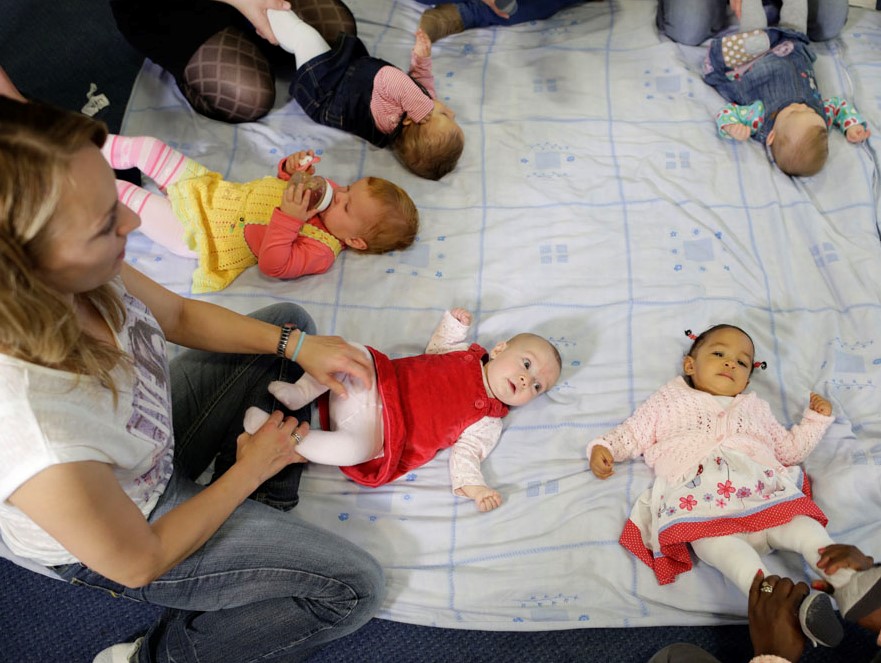
Side Quote Color:
baby & toddler club: cbeebies
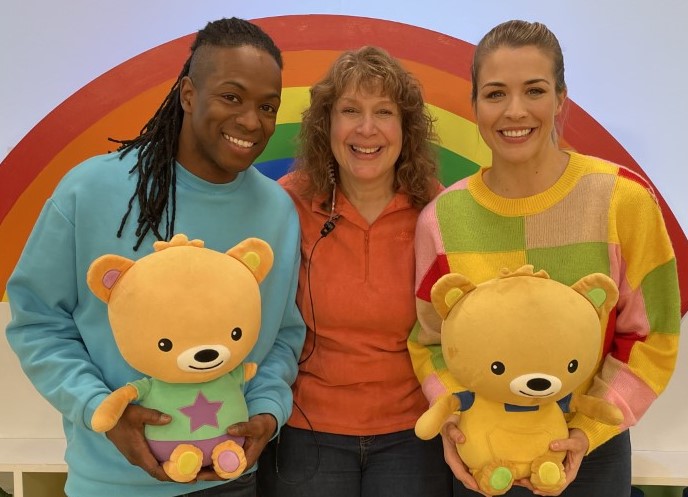
April 2022 update: CBeebies' The Toddler Club is now on our TV screens! We had great fun meeting new presenter Gemma Atkinson late last year as her Toddler Club journey began, to talk all things working with toddlers and families.
It was fantastic to be back as educational consultant for the filming in the studio, with the amazing families, presenters and production team (Peeple's Helen pictured with Gemma, Nigel Clarke, and toddler twin bears Bailee and Benjee). As Gemma put it: "This show is about showing all aspects of parenting. No judgment, lots of laughs, snot, tears and tantrums. Basically the everyday life of parenting that we all navigate in our own way."
You can see the latest 15 minutes episode every weekday during April on CBeebies, or catch up with the Toddler Club on the BBC iPlayer. It combines toddler group sessions with songs, story and activities - as well as toddlers who sometimes join in and sometimes don't, just like they do (or don't!) - and new clips from families' homes, which were so popular in 'The Toddler Club at Home' episodes during the lockdowns. (If you have a baby, you can still find The Baby Club episodes on the iPlayer too.)
We hope you enjoy it - and if it inspires you and your little one to join a baby or toddler group, you can find out more in our Parents Area.
October 2021: the team are working on the first series of The Toddler Club to be filmed in the studio, with lots of local families and lively toddlers!
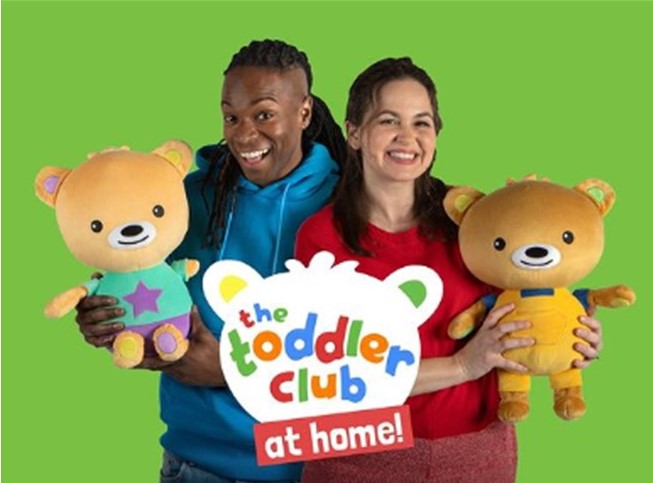
This follows the success of 'The Toddler Club at Home', filmed remotely during lockdown including lots of great clips from families. Click the links to catch the 20 episodes of The Toddler Club at Home or the first 98(!) episodes of The Baby Club on the BBC iPlayer, and lots of great Baby Club songs to join in with.
January 2021: The latest series from the team is now on CBeebies and BBC iPlayer - this time 'The Toddler Club at Home', to include slightly older children. There are 20 brand new episodes of about ten minutes each. They pack in lots of simple ideas (and clips from families at home) around a theme such as routines, opposites, colours, conversations. Rather than using a story book, Nigel or Gi tell a story and invite children and parents to join in - you don't need a book to tell a story! And there are twin baby bear characters to meet, and a catchy new toddler bop song.
June 2020: New ‘The Baby Club At Home’ episodes have started on CBeebies - offering parents and their babies (up to 18-months or so) the chance to join in with new ideas and activities, have a sing-a-long and maybe even spot yourself in the process! It's hosted by the usual presenters Giovanna Fletcher and Nigel Clarke from their own homes, along with lots of video-clips sent in by parents, of themselves and their babies playing and singing during lockdown. It's a spin-off series of the hit CBeebies ‘The Baby Club’, and we at Peeple are excited to be educational consultants again! Short 6-minutes episodes are on CBeebies at 9.25am every Saturday and Sunday, and available afterwards on the BBC iPlayer.
Feb 2020: BBC television's The Baby Club on CBeebies has been commissioned for a third series, and we're delighted to be working on it again as educational consultants. We've also been working with The Baby Club Team on a related book Play and Learn with your Baby, which has just been published by DK.
The Baby Club is CBeebies' first TV programme for parents, as well as their babies and toddlers. Presenters Nigel Clarke and Giovanna Fletcher will be back, along with Baby Bear, and lots of new ideas and activities to share.
The Baby Club is a 15-minute programme, sharing simple play ideas, songs and stories with parents and their babies, using everyday objects from around the home. It also gives a taste of what it's like, going to a parent and baby group. It's built up a loyal following with families, and we hope you enjoy it too. If you haven't seen it yet, you can catch the first two series on the BBC iPlayer.
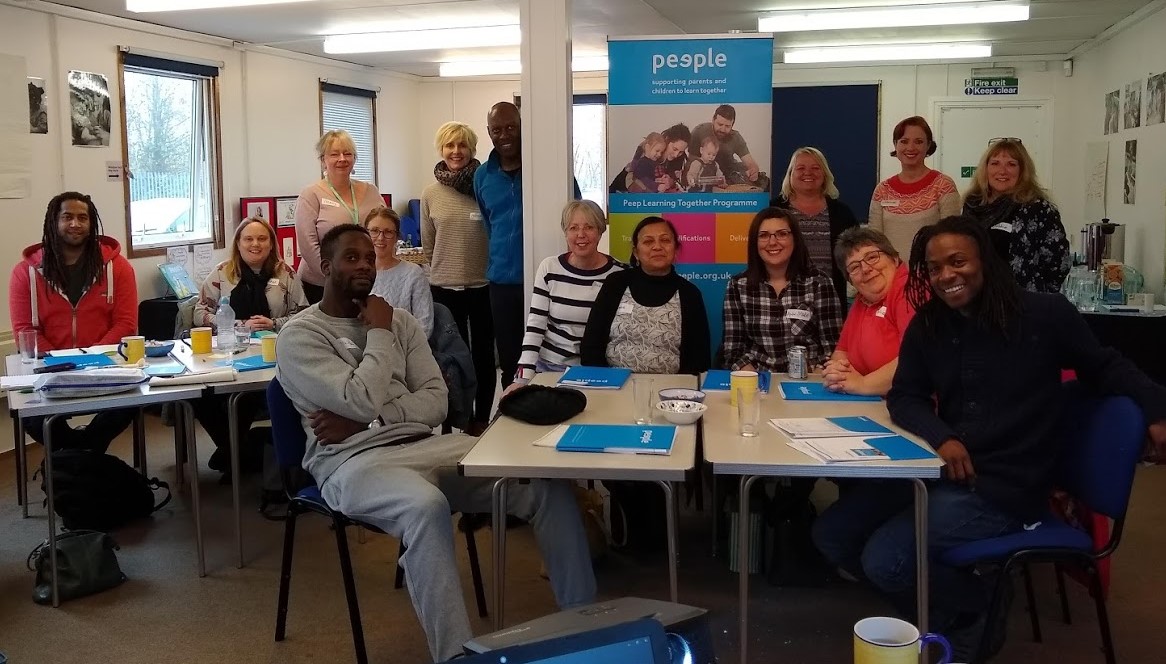
It was great fun sharing our Peep Learning Together training with Giovanna and Nigel - you can see Nigel with his fellow Peep practitioners on the course he attended here at the Peeple Centre before the first series. He's also been writing his Nigel's Baby Club Diaries blog, which is well worth a look.
Check out our social media pages where we share similar ideas for things to do at home - for babies, toddlers and pre-schoolers. And hopefully you or parents you work with will be inspired to find a local parent and baby/ toddler group, like Peep, if you haven't already!
Peep Facebook, Peep Instagram and Peep Twitter - all @PeepleCentre | TheBabyClubTV instagram | Nigel's instagram | Gemma's instagram | Foundation Years Trust Instagram | Three Arrows Media Instagram | Play and Learn with your Baby book
Feature box colour:
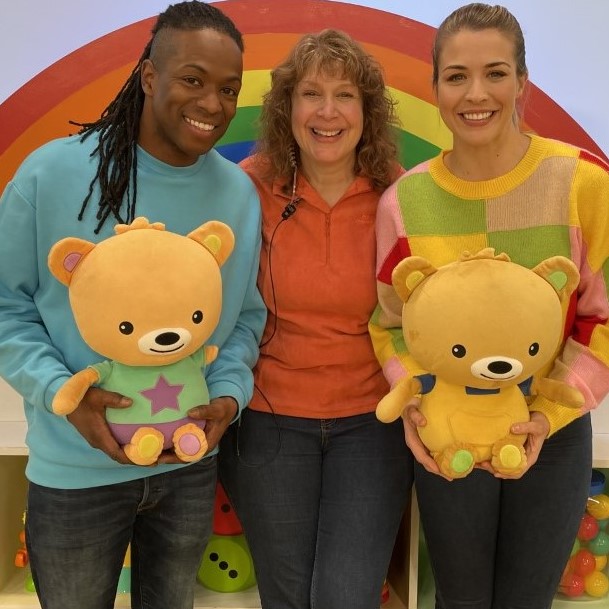
find out more or book training
tel 01865 397 970
training@peeple.org.uk
> dates & booking
> in-house training
> training courses
> sign up to our e-newsletter
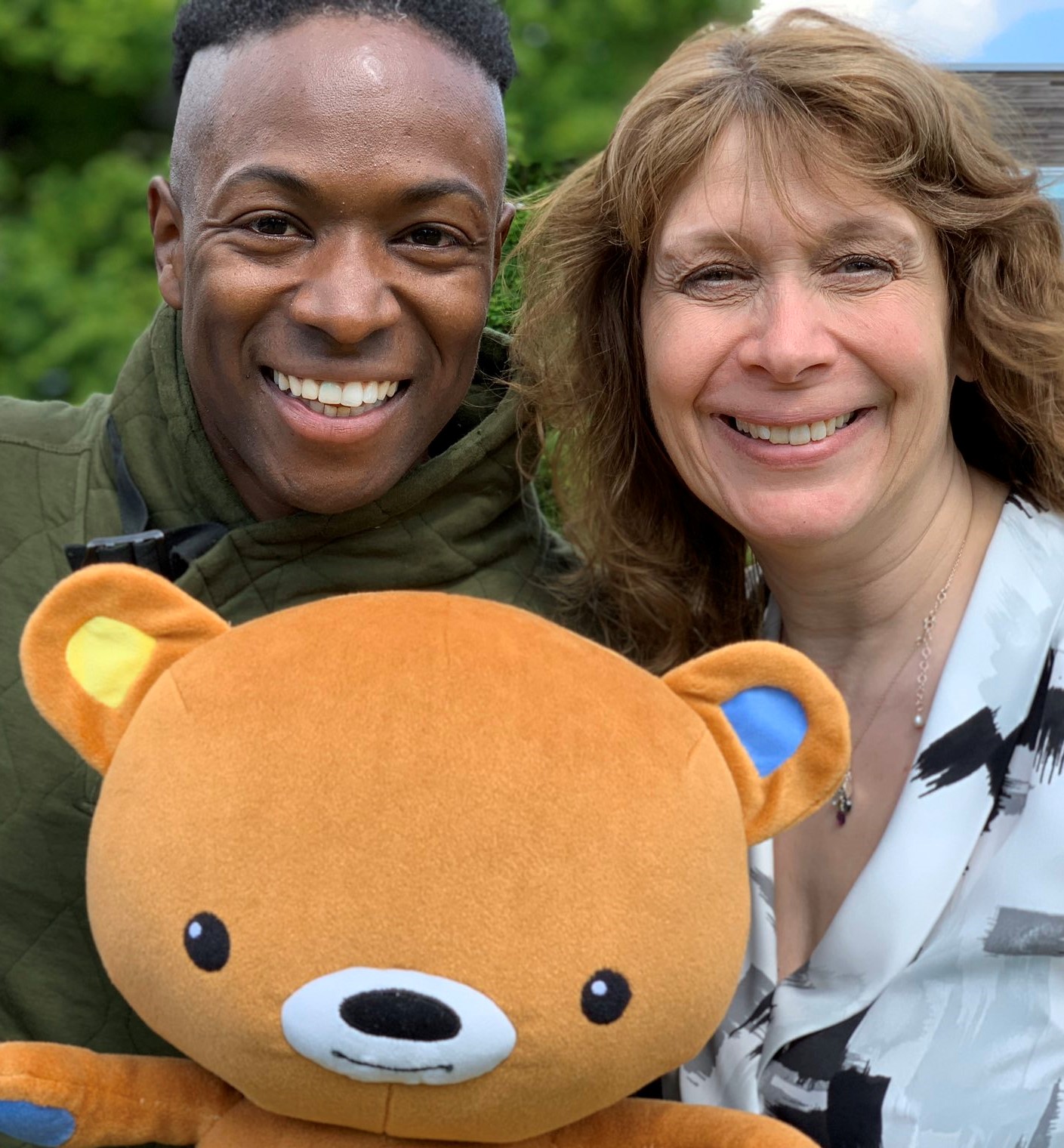
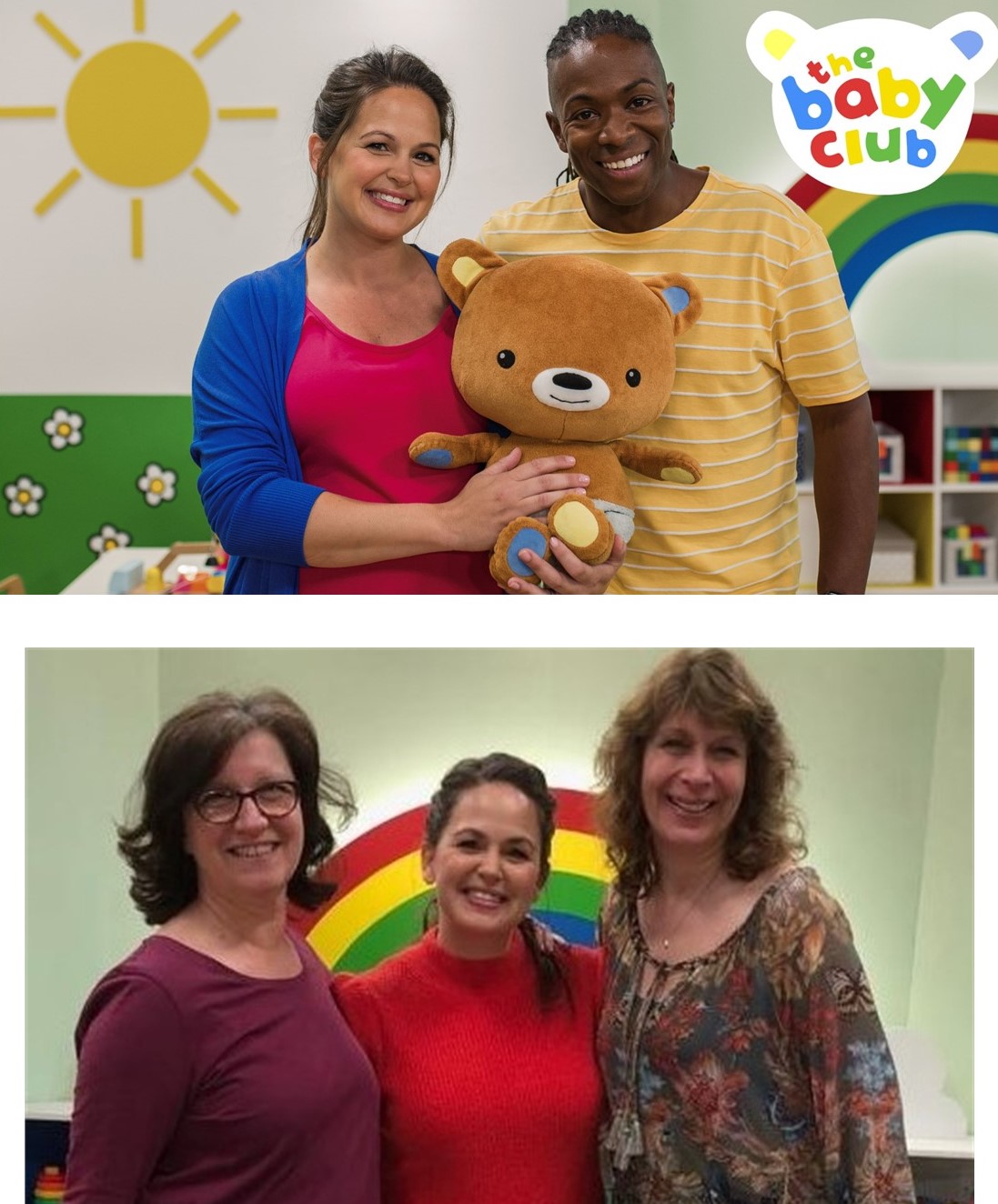
Side Quote Color:
policy links and peep
The Peep Learning Together Programme is an early intervention and prevention programme, deliverable by and across a range of disciplines. We train, support, resource and accredit practitioners to work with families to recognise how they already support their children's learning and development and gain the knowledge, skills and confidence to do more.
The web-pages in this section link to a number of the key government policies which have influenced and/or been influenced by Peeple and Peep programmes.
> Policy links and Peep: Scotland
> Policy links: England and Wales
UK-wide policies
> UK STEM Policy and the Peep Learning Together Programme (8-pg) (Jan 2019)
> UK STEM Policy and Peep LTP - Summary (2-pg + links)
STEM (Science, Technology, Engineering and Maths) is increasingly seen as important to future development. Governments across the UK have developed a number of STEM strategies and policies. The above document provides links to the policies, and outlines how the Peep Learning Together Programme supports them, from the earliest years.
'I think the Peep programme has the child and family at the centre and we work with the parent to give them the best possible experience and interactions with their child. We are encouraging, motivating and supporting families through an informal education approach. The parents have the opportunity to gain accreditation and recognition for their learning. They are modelling success with their children'. Alison Wales, Peep Coordinator, South Ayrshire
policy links and peep
Feature box colour:
find out more or book training
tel 01865 397 970
training@peeple.org.uk
> dates & booking
> in-house training
> training courses
> sign up to our e-newsletter
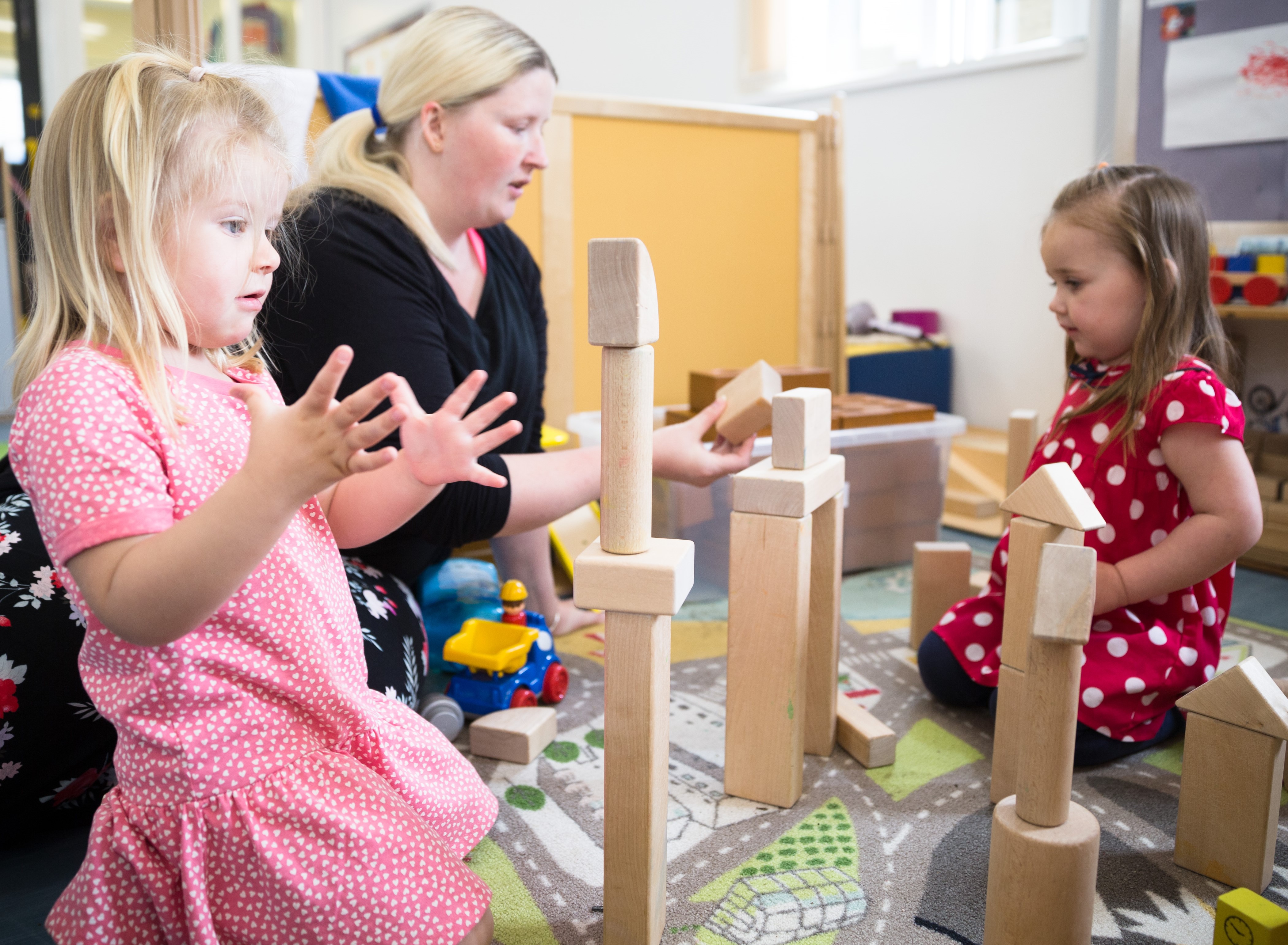
Side Quote Color:
policy links - England, Ireland and Wales
Here you can find some government policy links (and reports that have influenced government policy) that are relevant to Peeple's aims and to the parenting and early years sectors more generally.
> How Peep Programmes support early years Health work with families - demonstrates how Peep links to Public Health England's and the Dept of Health and Social Care's Six early years high impact areas for health visiting, relating to the Healthy Child Programme and MECC (make every contact count) approach (2018). The Peep approach also complements the iHV's 'Health Visiting in England: A Vision for the Future' (2019). Midwives, health visitors and community nursery nurses are often the main people, beyond close family and friends, that families have contact with during the weeks and months before and after a child's birth. The Peep Antenatal Programme and Learning Together Programme offer a simple way that they can share practical ideas with families, supporting the early development of a strong attachment relationship.
> 'Improving the home learning environment: a behaviour change approach' (Nov 2018, Department for Education)
Changing behaviour to help promote early language and literacy development through the home learning environment (HLE).
early education, learning and development:
> 'Early Years Foundation Stage (EYFS) statutory framework' (updated April 2018, Department for Education) - England and Wales - The standards that school and childcare providers must meet for the learning, development and care of children from birth to 5.
> Foundation phase framework for 3-7 year olds - Wales
> 'Foundations for quality: Review of early education and childcare qualifications' (June 2012, Professor Cathy Nutbrown)
> 'The Early Years: Foundations for life, health and learning' (March 2011, Dame Clare Tickell, Chair of the EYFS Review)
Government-commissioned Independent review into the impact of the early years foundation stage (EYFS) on children's learning and development, and early years practitioners.
> Learning to learn framework - early years education and learning - Northern Ireland
> National Quality Framework for Early Childhood education - Siolta (birth to six years) - Republic of Ireland
> Curriculum framework for early childhood - Aistear - Republic of Ireland
Review of Children and Young People's Mental Health provision:
> 'Transforming children and young people’s mental health provision: a green paper' - and the government's response to the consultation and next steps (July 2018, Department for Health and Social Care, and Department for Education)
> Peeple's response to the mental health provision green paper consultation (March 2018, Peeple)
> 'Are we listening? Review of children and young people's mental health services' (March 2018, Care and Quality Commission, the independent regulator of health and social care in England)
> 'Social mobility policies between 1997 and 2017: time for change' report (June 2017, Social Mobility Commission)
> 'Early Intervention - Briefing Paper' (June 2017, for House of Commons library)
"Early intervention is a public policy approach which encourages preventative intervention in the lives of children or their parents, to prevent problems developing later in life. Interventions can either be targeted at children deemed to be at higher risk of disadvantage, or can be universal in scope. As well as the political and social benefits of preventing poor outcomes in later life, such as mental health problems, low educational attainment and crime, advocates of early intervention also cite economic benefits to the approach. This is based on the argument that preventative policies cost less to implement than reactive policies. Due to the rapid pace of physical and social development in children’s early years, early intervention is a policy approach often targeted at very young children. This briefing paper looks at early intervention in terms of policies targeted at children from conception to age five."
> Childcare Act 2016 (March 2016, UK Parliament)
"An Act to make provision about free childcare for young children of working parents and about the publication of information about childcare and related matters by local authorities in England."
> 'Sure Start Children's Centres: guidance for local authorities' (April 2013, Department for Education)
> 'Best Practice for a Sure Start:The Way Forward for Children’s Centres' - (July 2013, Report from the All Party Parliamentary Sure Start Group)
> Building a brighter future: Early Years and Childcare Plan: Wales (2013, Welsh Government)
> 'Review of Child Protection: a child-centred system' (May 2011, Professor Eileen Munro, Dept for Education-appointed review)
> 'Early Intervention: The next steps' (Jan 2011, Government-appointed Early Intervention Review Team/ Graham Allen MP)
> 'The Foundation Years: preventing poor children becoming poor adults' (Dec 2010, Government-appointed Review on poverty and life chances/ Frank Field MP)
> 'Fair society, healthy lives: strategic review of health inequalities in England post-2010' (Jan 2010, Professor Sir Michael Marmot, Dept for Health-appointed independent review). 'The Marmot review 10 years on' is due to be published Feb 2020.
> 'Opportunity for all: Tackling poverty and social exclusion' (Sept 1999, Dept for Social Security)
Feature box colour:
Side Quote Color:
vision, mission, aims and annual report
our vision
Every family makes the most of everyday learning opportunities which improve life chances and help narrow the gap in attainment.
our mission
Peeple exists to help parents improve their children’s life chances, particularly in less affluent areas, by making the most of everyday learning opportunities at home and in the community. Our core purpose is to narrow the gap in attainment particularly by supporting parents in raising their babies and young children to reach their full potential. We do this by developing interventions which support parents as their children’s first educators, by training practitioners to work with families and by supporting the implementation of our programmes. We also deliver services directly to families and help parents to gain qualifications which lead to further education or employment. In addition, we contribute to research and policy development in early years education.
Our work is underpinned by the Peeple principles.
peeple aims 2023-24
- Train and accredit more practitioners to support families with their young children’s learning
- Provide more support for trained practitioners to implement Peep programmes
- To accredit more parents with Peep Progression Pathway units
- Support more families in Oxfordshire
- To provide high quality early learning and childcare at Little Peeple Nursery
- To develop new interventions and extend the Learning Together Programme resources
- To share evidence and good practice with the Early Years sector, policy makers and researchers
- To ensure good governance, management and infrastructure
peeple annual report
> Download our Annual Report 2022-2023
our vision, mission, aims and annual report
Feature box colour:
find out more or book training
tel 01865 397 970
training@peeple.org.uk
> programmes
> training courses
> dates & booking
> sign up to our e-newsletter
peep parent comments:
'Peep helped us bond more, we learned new songs and how to make things with everyday stuff at home'
‘I felt isolated but found Peep a lifeline’
